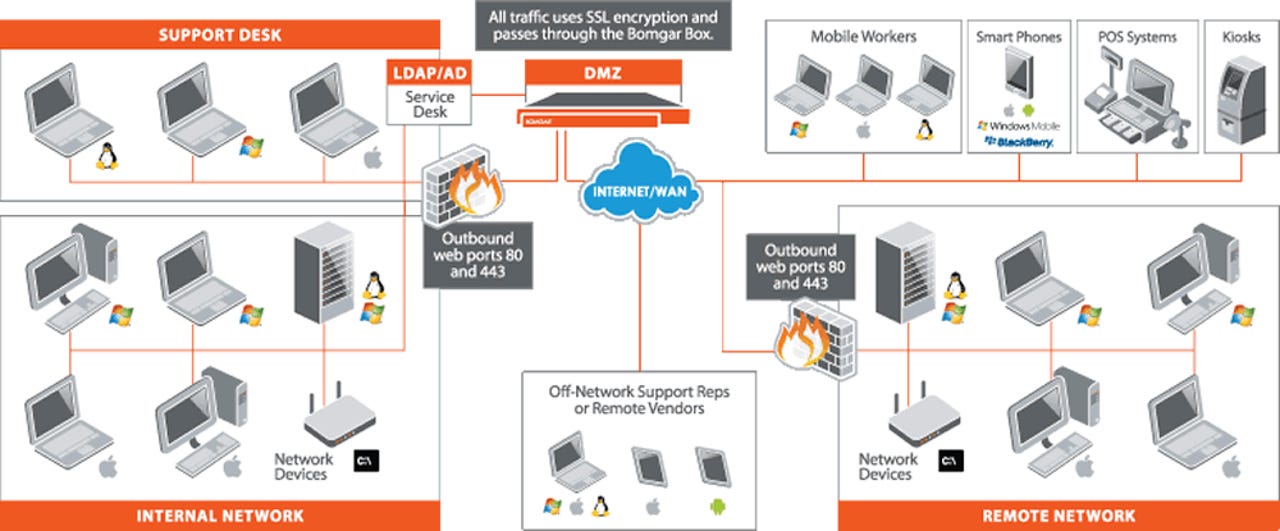Why Bomgar's remote support technology is finding appeal outside the enterprise


Despite the deluge of coverage about cloud-based applications and services for small and midsize businesses (SMBs), not every small company is comfortable with the idea of operating in the cloud, especially in places where internet access isn't always reliable.
That reality is one reason the Bomgar "box" — a rackmount appliance originally designed by a network field engineer for handling his enterprise support applications — is finding a following with small, locally focused IT solution providers that need to manage infrastructure for clients scattered across more territory than their staff can comfortably cover.
Case in point is RBS/CRP, a 13-person Micros reseller and service company that supports pretty much all of the point-of-sale (POS) vendor's big accounts across Hawaii. That's a lot of ground to cover, scattered across eight major islands.
"It can be a challenge to get everywhere we need to be," said Ryan Lee, owner of the solution provider. "But with Bomgar, we can get in remotely without having the technician go to the site."
According to Lee, what distinguishes Bomgar from the myriad other clientless remote support technologies that a managed service provider or IT manager could choose — from the likes of Citrix, WebEx, LogMeIn, and NTRGlobal — is its simplicity. Its revenue grew by more than 70 percent over the three years from 2010 to 2012.
Bomgar's device can be used to manage everything from smartphones to services to tablets to kiosks. It's also secure enough to stand up to the PCI compliance guidelines that RBS/CRP needs to meet for its retail clients, Lee said. That's also great for healthcare companies, financial services and other clients with privacy concerns.
Accordingly, RBS/CRP uses the Bomgar technology daily to run system updates, help restaurants and retailers with running batch transaction processes, updating menu items and inventories within POS systems, and even to manage its own sales presentations.
One account for which the appliance is used regularly is Highway Inn, a third-generation family-owned business with about 90 employees split between two locations on the island of Oahu that are just far enough apart to create a logistical challenge for the current owner, Monica Toguchi. The technology has been particularly useful for managing price fluctuations, especially for the catering operation, Toguchi said.
"I am able to change the information in real time and have them update the systems almost immediately," she said. Previously, Toguchi and her staff were beholden to IT technicians that had to drive from location to location to update her Micros installation. Now, aside from rapid changes, she receives a store summary every evening that is initiated via Bomgar, with the reports delivered to a Dropbox account.
The latest version of the technology, Bomgar 14.2, was released in mid-June. New features include Jump Client Access Schedule, which lets organizations control when either external vendors or their own IT staff can remotely access systems. (For example, access could be confined to overnight or early morning hours.) There are also new Remote Registry Editor and System Information Actions options, which let support personnel work on a computer or system without interrupting someone who might be using it.
Bomgar doesn't publish its pricing on its website (at least not that I could find), but Lee tells me that RBS/CRP pays on a per-seat license basis — regardless of how many customers are managed through the appliance.
Officially founded in 2003, Bomgar says there are approximately 8,000 organizations currently using its technology for service and support tasks. In early May 2014, the company received an undisclosed majority investment from private equity firm TA Associates.
"The consumerization of IT paired with the influx of devices making up the Internet of Things is creating demand for new ways to access, support and manage remote systems," said Matt Dircks, who was appointed CEO of Bomgar, in a statement. "With TA's guidance, we will have additional experience and resources to fully leverage these opportunities."